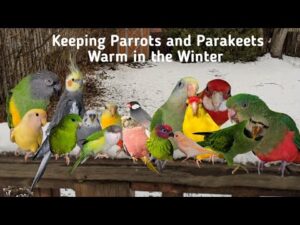
Winter can be a challenging time for bird owners and those who care for backyard birds. Whether you have pet birds in your home, backyard chickens, or you enjoy feeding wild birds, ensuring their comfort and survival during cold weather is essential. Birds are naturally resilient, but extreme cold temperatures, strong winds, and lack of food sources can make winter a dangerous season for them.
In this guide, we’ll cover the best ways to keep birds warm in the winter, from proper housing and feeding to extra precautions that will help them thrive in chilly conditions.
1. Provide Proper Shelter
One of the most important steps in keeping birds warm during winter is ensuring they have a safe, insulated, and windproof shelter.
For Pet Birds (Indoor Birds like Parrots, Canaries, and Finches)
- Keep Their Cage Away from Drafts: Move your bird’s cage away from windows, doors, and any areas with cold drafts. A slight breeze can drastically lower their body temperature.
- Cover the Cage at Night: Using a breathable but warm cage cover at night can help trap heat and create a cozy sleeping environment.
- Use a Heated Perch: Heated perches provide warmth for birds’ feet, preventing cold-related injuries.
- Maintain Room Temperature: The ideal room temperature for most pet birds is between 65°F to 80°F (18°C to 27°C). If it drops below this, consider using a safe ceramic heat lamp or space heater.
For Backyard Birds (Wild Birds and Poultry)
- Birdhouses and Roosting Boxes: Provide properly insulated birdhouses or roosting boxes where birds can escape the cold. These should be facing away from the wind and elevated to avoid predators.
- Winter-Proof the Coop: If you have chickens, ensure the coop is well-ventilated but insulated. Block out drafts but avoid sealing it too tightly, as proper airflow prevents moisture buildup and respiratory issues.
- Straw or Wood Shavings: Use thick bedding like straw or wood shavings to keep the coop warm and dry.
2. Provide Extra Food and Water
Birds need more energy to stay warm in the winter, which means they require extra high-calorie food and access to fresh water.
For Pet Birds
- Offer Warm, Nutritious Foods: Soft foods like cooked rice, scrambled eggs, or oatmeal (without sugar) can provide extra warmth and energy.
- Increase Seed and Nut Intake: Birds burn more calories in winter, so offering more seeds and nuts can help maintain their body temperature.
For Backyard Birds
- Use High-Energy Bird Food: Suet cakes, sunflower seeds, peanuts, and mealworms provide fat and protein that birds need to generate body heat.
- Keep Bird Feeders Full: Refill feeders regularly since birds rely more on feeders in winter when natural food sources are scarce.
- Provide Unfrozen Water: Birds can struggle to find water in winter due to frozen lakes and ponds. Use heated bird baths or replace water frequently to prevent freezing.
3. Protect Birds from Frostbite
Birds can suffer from frostbite on their feet, combs, and wattles (for chickens and other poultry). To prevent this:
- Use Petroleum Jelly: Applying a thin layer of petroleum jelly on chickens’ combs and wattles can prevent frostbite.
- Provide Roosting Bars: For chickens, ensure they have wide perches to sleep on so they can cover their feet with their feathers while resting.
- Limit Exposure to Snow and Ice: If birds are outside, provide areas where they can walk without direct contact with ice or snow, like placing straw or wooden boards on the ground.
4. Use Safe Heating Methods
For Indoor Birds
- Use Bird-Safe Heating: Avoid dangerous heating elements like open flames, heat lamps, or kerosene heaters. Instead, opt for ceramic heat emitters that provide warmth without light.
For Backyard Birds
- Avoid Fire Hazards: If using heat lamps for chickens or outdoor birds, ensure they are secure and away from flammable materials. Many coop fires occur due to faulty heat lamps.
- Straw Bale Windbreaks: Placing straw bales around the coop or aviary can help block cold winds and provide extra insulation.
5. Monitor Their Health
Winter can be stressful for birds, and cold temperatures can lead to health issues such as respiratory infections, weight loss, and frostbite.
Signs of a Cold or Sick Bird:
- Fluffed-up feathers for long periods.
- Lethargy or decreased activity.
- Decreased appetite or water intake.
- Shivering or appearing hunched over.
If you notice these symptoms, take action immediately by increasing warmth, adjusting their diet, and, if necessary, consulting a veterinarian.
Final Thoughts
Keeping birds warm in winter requires proper shelter, high-energy food, fresh water, and safe heating methods. Whether you’re caring for pet birds, backyard chickens, or feeding wild birds, these simple but essential steps will help them stay warm and healthy throughout the cold months.
By taking these precautions, you can ensure that your feathered friends survive and thrive in winter, making their environment safe, warm, and comfortable despite the chilly weather. ❄️🐦